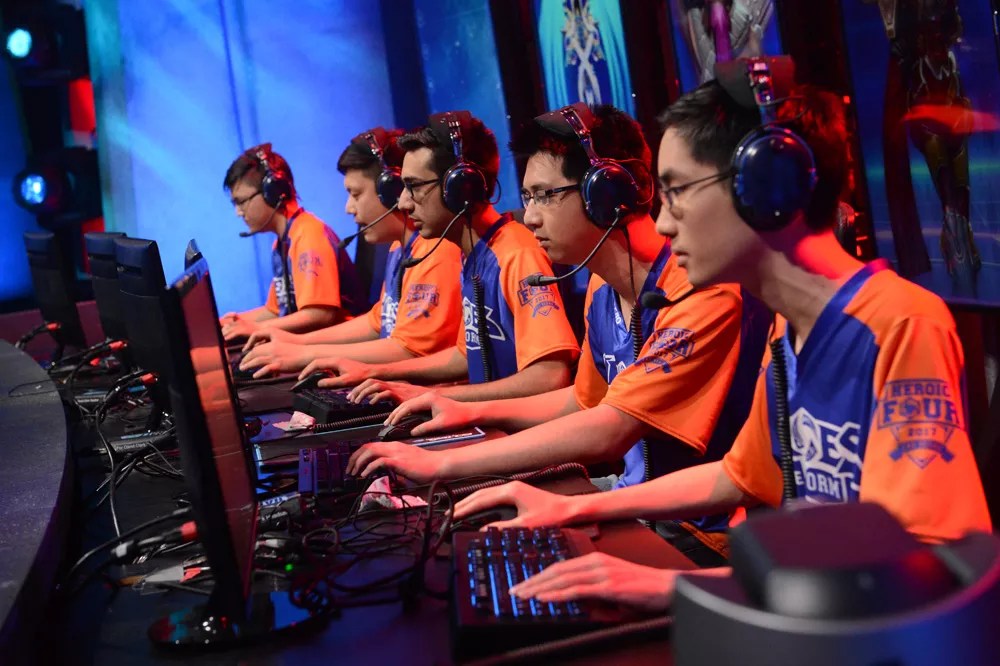
courtesy Blizzard games

Audio By Carbonatix
The University of Texas at Arlington is one bout away from scoring its first major championship in front of a roaring crowd in a Las Vegas stadium. The only things standing in its way are the best and the brightest from Louisiana State University and their offensive line of deadly assassins.
April 2017 is a heady time for the team at Blizzard Entertainment’s Heroes of the Dorm tournament. The UTA team members easily blew through their competition, with an undefeated record going into the final bout of Blizzard’s college tournament. The game they are playing, Heroes of the Storm, is a hyperaggressive combat game, and their strategy is appropriately combative. They have an attack-and-drive play style that brings the fight quickly into enemy territory.
LSU has a similar aggressive playing style, and it also has home-field advantage, thanks to the loud “L-S-U!” chants echoing at the start of the match.
The UTA team takes advantage of the compact layout and minion recruitment opportunities on the “Tomb of the Spider Queen” map as it burrows lanes through its opponents, putting LSU in a defensive mode. Even with two of its players in unfamiliar territory, UTA knows how to play in the clutch.
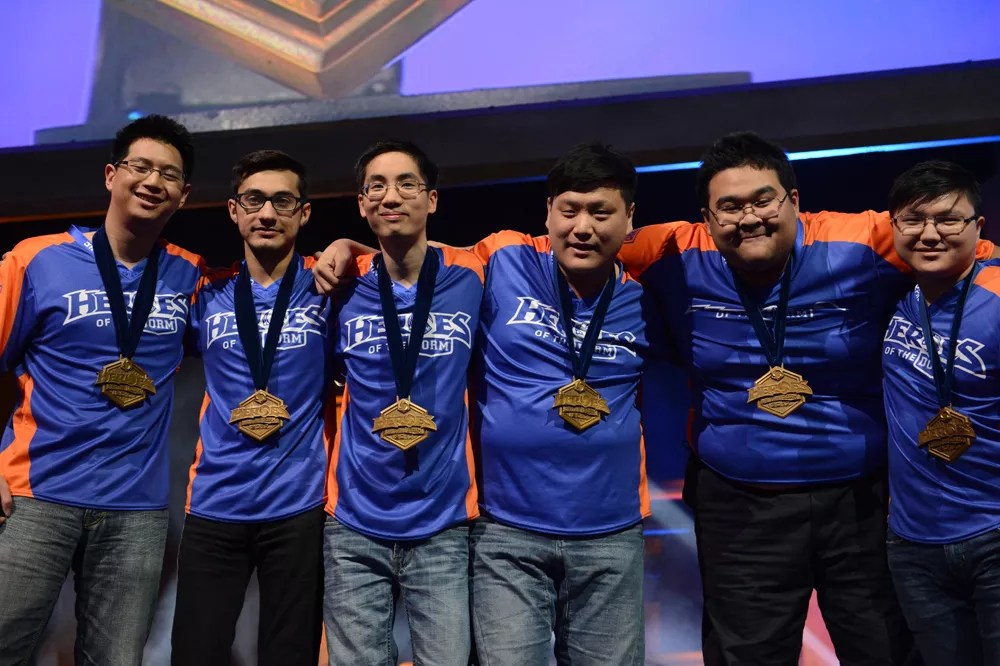
The UTA team celebrates its victory playing Heroes of the Storm in Las Vegas.
courtesy Blizzard Games
“Back when we first formed in January, we were already known as a powerhouse, but two of us had to switch our roles,” UTA team member Kevin Park says. “It’s like turning a quarterback into a lineman, and we ran with it. At first, we didn’t think we would be that bad, but we got better and better and more coordinated.”
UTA’s unrelenting mist of smoke and flame creates chaos for LSU as the team is whittled down to just one assassin by the end of the final round. LSU’s fallen guard gives Kevin Park, his brother Toby Park and his teammate Yusuf Sunka a clear lane to turn their enemy’s “Core” into a pile of rubble, creating a path to a decisive victory.
Back in the real world, the team celebrates. This victory nets each player a $75,000 scholarship and newfound respect from those on campus.
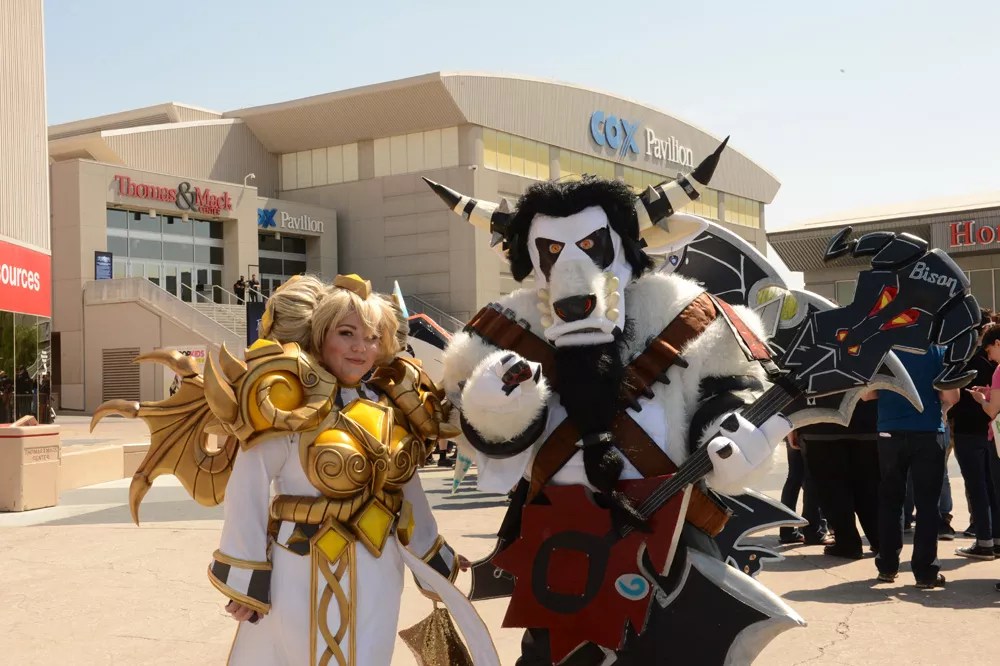
Cosplayers attend the Heroes of the Dorm competition in Las Vegas.
courtesy Blizzard games
eSports has become lucrative entertainment. The playing fields exist in a virtual universe stored on a lightning-fast hard drive, and the competitors are sitting almost motionless in front of keyboards. Yet the matches attract enough fans to flood arenas on game day, and the prizes can reach into the millions.
“I think what is pretty impressive are the prize pools,” says Benjamin Kratsch, the global content director of eSports.com. “The Dota 2 International tournament has a prize pool of $25 million, and if you compare that to things like the prize pool for the Tour de France, they have a prize pool of $2.75 million.”
eSports is a global franchise that pulls in millions from all over the world through sponsorships, team
However, eSports has the momentum to compete with the likes of pro basketball and football with its legions of
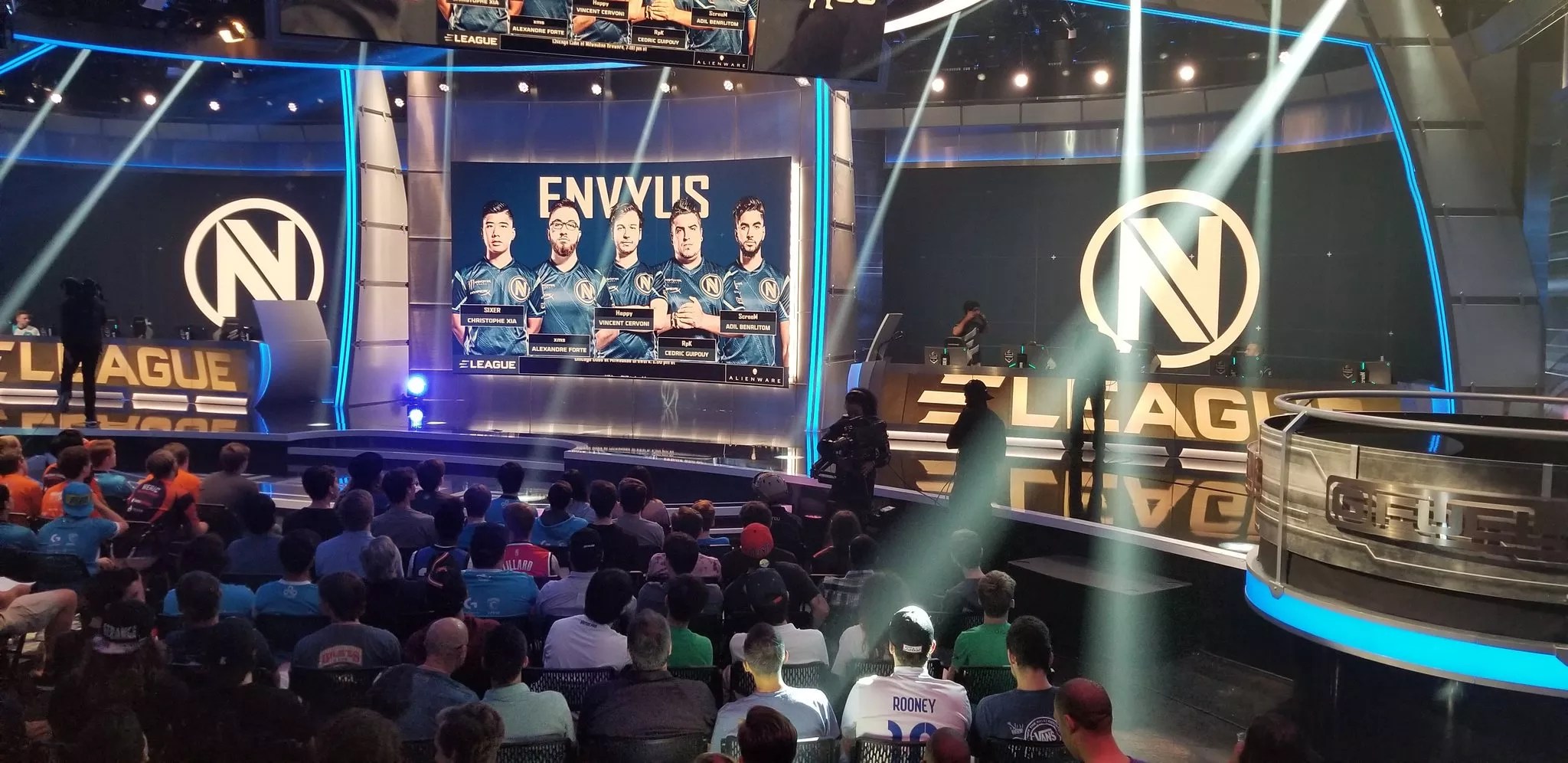
Team EnVyUs plays Counter-Strike: Global Offensive.
courtesy of Team EnVy
eSports brands and teams are also making monetary moves by attracting the same kinds of high-dollar sponsorships as pro football and basketball teams like beverage brands and fast food chains that you see commercials for during Sunday football games. Team EnVyUs just announced a multiyear sponsorship agreement with fast-food giant Jack in the Box for its brand and its upcoming Dallas Fuel team for the new Overwatch League launching next year. That’s on top of the initial multimillion-dollar investment it received from local oil magnate and George W. Bush Presidential Center CEO Kenneth Hersch to set up the Dallas team.
“eSports gamers are not a bunch of kids sitting in a room playing games,” Kratsch says. “They have professional instructors behind it, professional PR and marketing behind it, and professional coaches and training with some of the best fitness coaches who train with Olympians and even come from the military.”
Gaming giants in DFW are attracting players to the area. Shane “Rapha” Hendrixson, a member of Team Liquid who competes on id Software and Bethesda Softworks’ Quake Champions, moved from Chicago last July to be closer to the game’s main stage.
“I figured with how adamantly Bethesda and id are trying to push Quake into the eSports realm that it would be best to move down here because the internet is much better down here, as is the cost of living for just moving into the city,” Hendrixson says. “Once I became a resident, it was just nice to not have to pay [state] income tax.”
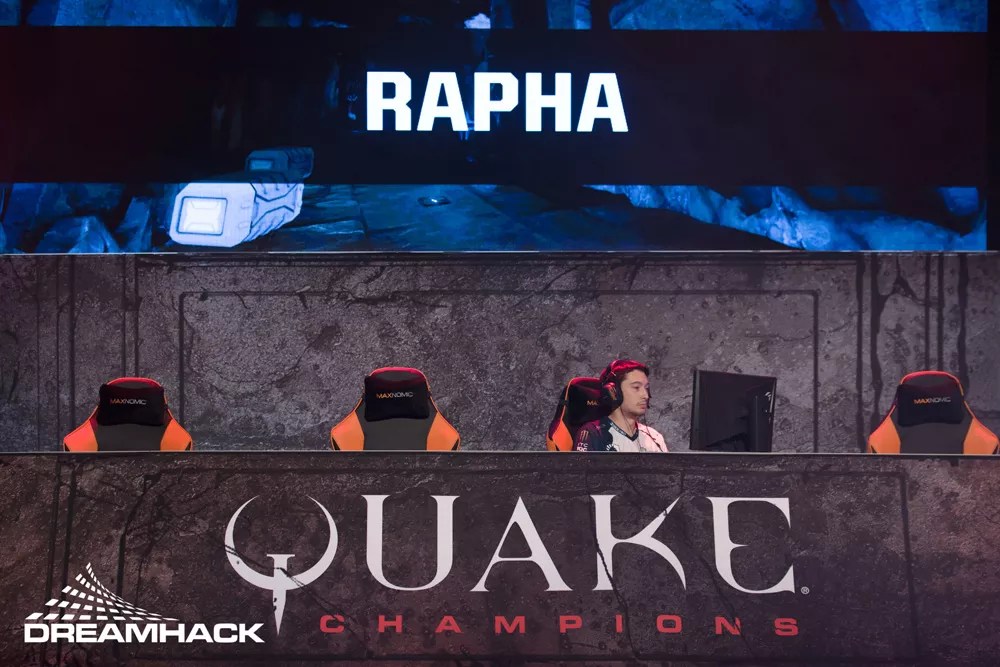
Shane “Rapha” Hendrixson is star player on Team Liquid who compete in Quake Champions.
Robert Paul
What is needed to grow eSports is a pipeline of new stars, and the industry sees colleges as
“Professional sports are so popular because they do the human story so well,” says Tim Willits, game director at Dallas-based id Software, creators of Quake. “We know who Stephen Curry is. They know the story of the kid who plays Quake, wins a keyboard and wins $500 and ends up being the captain of the team. We need an eSports environment that has enough grassroots support that
DFW universities are accepting that challenge, with officials backing programs tailored to attract and build digital athletes in the same way as they do football players.
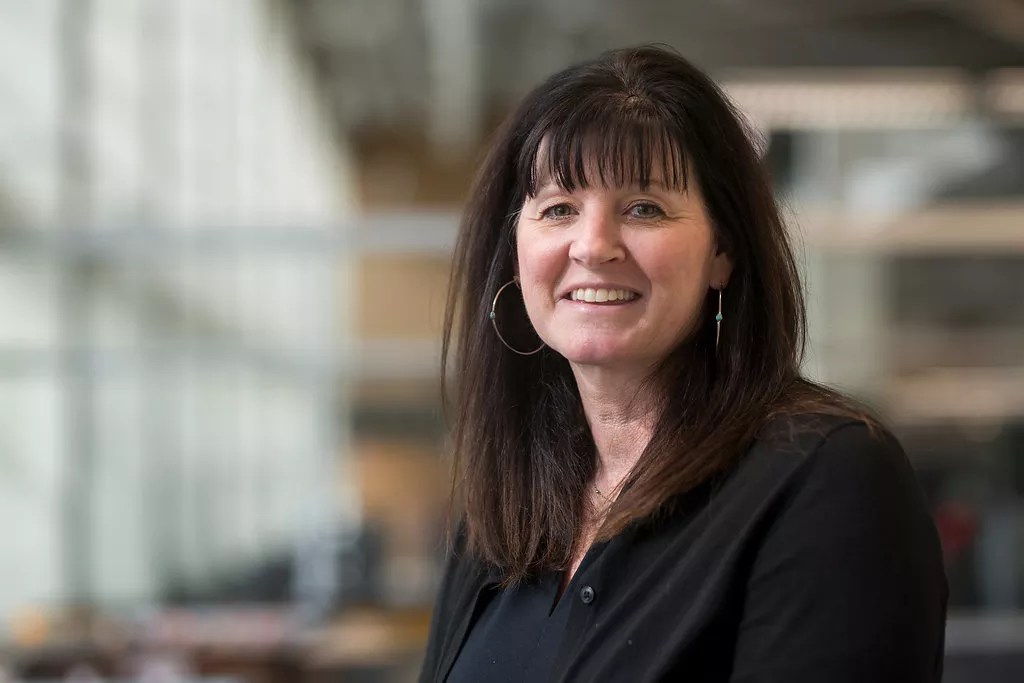
Laurie Klein says that the eSports stadium vibe is similar to Friday night football.
Brian Maschino
Laurie Klein, University of North Texas’ recreational sports director, entered the National Western Complex, a 10,000-seat venue in Denver, to experience eSports firsthand. The arena was packed with college teams and their fans, crammed together for hours of competitive gaming at a tournament called DreamHack Denver 2017.
“I spent hours upon hours sitting in the stadium watching these collegiate tournaments,” she says. “I’m a sports fan, and it was no different.”
Klein says the vibe was much like a Saturday night football game in Texas, and the mood was infectious. “I wish I would have understood the games and what was going on on the screen,” she says. “But when the crowd would erupt, it was no different than a crowd erupting over a touchdown.”
eSports may not be a cultural staple of Texas like football, but it’s finding a comfortable home in North Texas. Dallas is now one of the biggest eSports cities in the world with franchises such as Team EnVyUs setting up a Dallas Fuel team for the new Overwatch League that will launch next year with 12 teams in cities including Dallas, Los Angeles, Boston, London and Shanghai using investments from owners of NFL and NBA franchises.
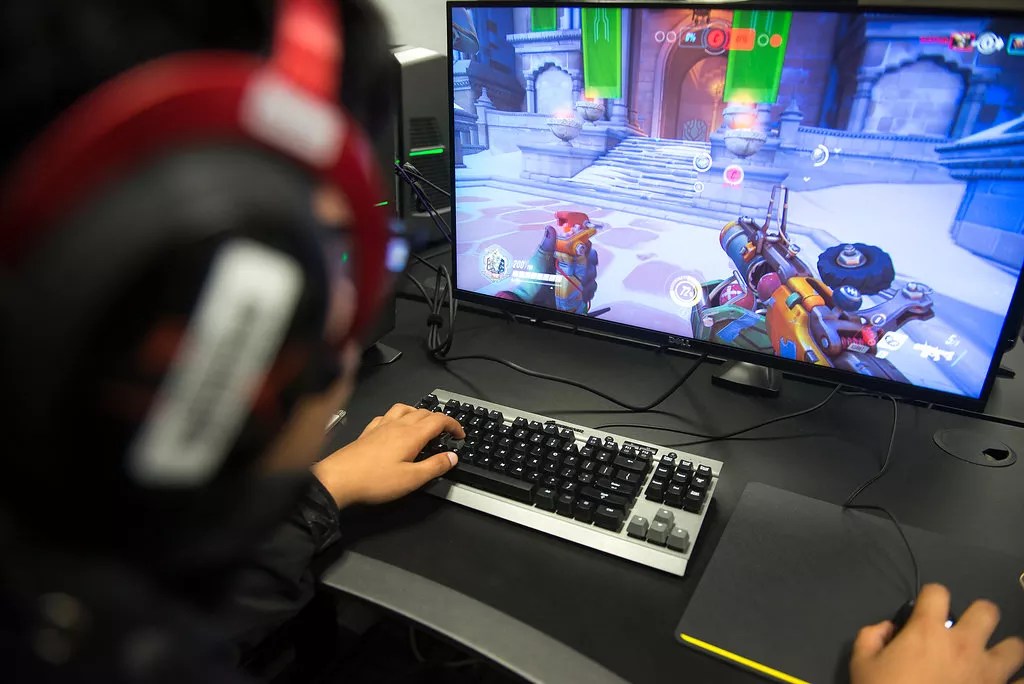
Students play eSports at The Nest, a space for competitive gaming in University of North Texas’ media library.
Brian Maschino
Another popular team, OpTic Gaming, is in the process of moving its headquarters to Dallas and competes in several leagues, including the Call of Duty World League, where it won the top $1.5 million prize in an August tournament in Orlando. With these heavy-hitting hometown teams, it’s no coincidence that the Call of Duty World League will host a regional open Dec. 8 at the Kay Bailey Hutchison Convention Center.
“The industry is just about to explode, I predict, on a collegiate level,” Klein says. “I know it’s already booming on a recreational level and a pro level, and we intend to join a league of some sort. Sitting down and watching a League of Legends tournament on ESPN2 is not unheard of.”
Universities such as UNT and the University of Texas at Arlington are building powerhouse eSports programs to train the next generation of gaming giants. UTA’s eSports club first formed in 2011 as an after-class activity where people played games like Starcraft II.
“Slowly but surely, it evolved into more and more people getting into gaming. We were getting so good after playing so long that we might as well get competitive,” club President Christian Gross says.
UTA’s team really started turning heads when they won a major tournament in Las Vegas last April that netted each player a $75,000 scholarship.
The UTA group formed several undefeated teams that competed in games like the shooter Counter-Strike; the mobile, multiplayer online battle arena Vainglory; Blizzard Entertainment’s free-to-play fantasy card game Hearthstone; and the sci-fi strategy title Starcraft. UTA’s team turned heads in April when it won Heroes of the Storm in Las Vegas.
“Before we got that win, it wasn’t even a bargaining phase,” Gross says. “It was a stonewall phase. We were an organization on campus and were told … ‘We don’t want anything to do with
“Once [we] got that win, the [UTA] president invited the entire team to have lunch with him, and he was very interested in where this could take the university. I definitely admire that of him because there is a great opportunity here that’s finally being seized.”
UTA’s team has the potential to help the university compete in athletics without having to build a multimillion-dollar program and stadium, Gross says.
“It’s not a university that has had any large-scale success with regular sports,” he says. “However, at the current rate that our organization has been blowing up and the status of the teams and the progress we’re seeing, I have no doubt that eSports at UT Arlington
UTA’s teams are making some headway without the help of a major collegiate sports league or athletic organization. The group has produced several players who have gone on to become known in the eSports industry and are attracting top gaming talent to the school because of the spotlight the eSports team has put on them. It’s negotiating with sponsors like the game developer Ubisoft and Monster Energy drinks and is working with OpTic Gaming to find homes for top players once they finish their degrees.
UNT will also have star players to add to their school’s athletic roster when they launch their eSports team next year. School officials also formed The Nest, a space in the campus’ media library where students can hone their competitive gaming skills on high-powered Alienware PCs. The program plans to launch three varsity teams with open tryouts sometime next year to compete in games such as Starcraft and League of Legends.
“About a year ago, we talked to UNT’s president about eSports and brought it to his attention because … we would try to have eSports events in libraries or campus venues, and it just was not possible because when you’re adding a computer to a LAN or a network. Eventually, no department wanted to be the first to say yes,” says Ethan Vivante, a senior computer science major and president of the gaming and eSports team. “So we talked to the president, and he was super excited and started delegating people to look into eSports more seriously.”
UNT’s team has made connections with professional, local eSports teams such as Team EnVyUs and Evil Geniuses. It hopes to set up scrimmages and partnerships once its varsity programs get going. Klein says UNT’s team has also had meetings with local teams at the school’s Frisco campus.
“It’s going to turn into the similar relationship we have with the Dallas Cowboys over there,” she predicts.

The new Dallas Fuel branding for Overwatch League which will launch next year.
courtesy Dallas Fuel
This fall, when OpTic Gaming announced it was relocating its headquarters from Chicago to Dallas, the city responded immediately.
“The Dallas Metroplex offers the knowledge and understanding of this new, emerging sporting,” CEO Hector Rodriguez says. “When we announced, we got an email from the Dallas Chamber of Commerce immediately asking about what our plans were and how they could help.”
“We’ve gone from the hotel ballrooms to the convention halls and the biggest arenas in the world.” — Mike Rufail, owner of the eSports team EnVyUs
Dallas was ahead of the curve of video games in the early ’90s and looks to keep its stature as a dominant hub for eSports. DFW remains home to pioneering studios such as 3D Realms, which brought the world the brash, alien-butt-kicking Duke Nukem 3D to PCs with a groundbreaking multiplayer mode, and id Software, the creator of first-person shooting classics Wolfenstein 3D,
“Quake was one of the earliest eSports titles being competed on, and the Counter-Strike tournaments were always held in Dallas,” says Mike Rufail, the
“It was much, much smaller back then. We’re talking about really just banquet rooms or hotel ballrooms, and from there, we’ve gone from the hotel ballrooms to the convention halls and the biggest arenas in the world.”
Randy Chappel is the managing director of Hersh Family Investments, which invested in Team EnVyUs so it could set up the Dallas Fuel team for the Overwatch League that will launch next year. He says Dallas is already the fourth-largest market for eSports in the country because of its history.
“Texas Instruments’ Jack Kilby invented the microchip here in the 1950s, and id Software had Doom,
The pace of the industry’s growth surprises even those who were there to plant the seeds. “We never planned it,” Willits says. “Back in 1996 when we made Quake, if someone said we’d see a time when we could fill a football stadium with people watching a video game and giving away a million dollars, we would have said, ‘no way.'”